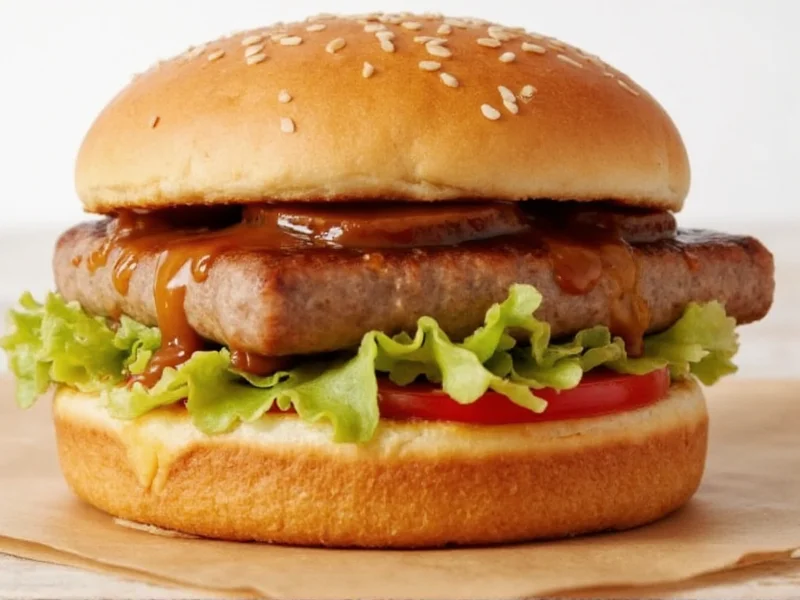When you're tracking your daily nutrition or making informed food choices, understanding the exact nutritional profile of fast food items becomes essential. The McDonald's Sausage McMuffin remains one of the chain's most ordered breakfast items, making its calorie count and nutritional information valuable knowledge for health-conscious consumers.
Nutritional Breakdown of the Sausage McMuffin
Breaking down the complete nutritional facts helps provide context beyond just the calorie count. Each Sausage McMuffin delivers specific nutritional components that contribute to your daily dietary needs:
| Nutrient | Amount | % Daily Value* |
|---|---|---|
| Calories | 400 | 20% |
| Total Fat | 23g | 29% |
| Saturated Fat | 8g | 40% |
| Trans Fat | 0.5g | - |
| Cholesterol | 55mg | 18% |
| Sodium | 920mg | 40% |
| Total Carbohydrate | 30g | 11% |
| Dietary Fiber | 1g | 4% |
| Sugars | 2g | - |
| Protein | 18g | - |
*Percent Daily Values are based on a 2,000 calorie diet. Your daily values may be higher or lower depending on your calorie needs.
Understanding the Calorie Composition
The calorie count in a McDonald's Sausage McMuffin primarily comes from three components: the sausage patty, the English muffin, and the melted cheese. The sausage contributes significant fat content, while the English muffin provides most of the carbohydrates. This nutritional profile makes it a substantial breakfast option that provides sustained energy but should be consumed mindfully as part of a balanced diet.
For those tracking specific macronutrients, the Sausage McMuffin offers a moderate protein content at 18 grams, which can help with satiety throughout the morning. However, the high sodium content (920mg representing 40% of the recommended daily limit) warrants attention, especially for individuals monitoring their salt intake.
Regional Variations in Nutritional Information
When researching mcdonald's sausage mcmuffin nutrition facts, it's important to note that nutritional values can vary by country. For example, the Canadian version contains 390 calories, while the UK version has 373 calories. These differences stem from variations in ingredient formulations, portion sizes, and local regulatory requirements. Always check the specific nutritional information for your region when tracking calories in a mcdonald's sausage mcmuffin.
Comparing Breakfast Options at McDonald's
Understanding how the Sausage McMuffin compares to other breakfast menu items helps put its calorie count in perspective. This comparison of mcdonald's breakfast menu calories reveals valuable insights for making informed choices:
| Menu Item | Calories | Total Fat (g) | Protein (g) |
|---|---|---|---|
| Sausage McMuffin | 400 | 23 | 18 |
| Egg McMuffin | 300 | 12 | 18 |
| Sausage Biscuit | 460 | 29 | 15 |
| Hash Browns | 140 | 8 | 2 |
| Blueberry Muffin | 410 | 12 | 6 |
This comparison of mcdonald's breakfast menu calories shows that the Sausage McMuffin sits in the mid-to-high range for calorie content among standard breakfast offerings. The Egg McMuffin provides the same protein content with significantly fewer calories and less fat, making it a better option for those watching their calorie intake while still wanting a satisfying breakfast.
Customization Options for Lower Calorie Count
Many consumers wonder about sausage mcmuffin without egg calories or other modifications. McDonald's allows several customizations that can reduce the calorie count:
- Order without cheese: Removing the cheese slice saves approximately 50 calories and 4g of fat
- Request egg whites instead: The Sausage Egg McMuffin with egg whites has about 370 calories
- Ask for light sausage: Some locations may accommodate requests for less sausage
- Substitute English muffin: No current lower-calorie bread option exists, but ordering without the muffin significantly reduces carbs
When considering is mcdonald's sausage mcmuffin healthy, it's essential to evaluate it within your overall dietary pattern. While it provides substantial protein, the high saturated fat and sodium content mean it shouldn't be a daily staple for most people following standard dietary guidelines.
Putting the Calorie Count in Context
A 400-calorie breakfast represents approximately 20% of a standard 2,000-calorie daily diet. For many adults, this provides adequate energy to start the day without excessive caloric intake. However, individual needs vary based on age, gender, activity level, and health goals.
Nutritionists generally recommend that breakfast should provide 20-25% of your daily calories, making the Sausage McMuffin appropriate in terms of portion size for many individuals. The key consideration becomes what accompanies this sandwich in your overall daily eating pattern. Pairing it with fruit or vegetables rather than additional high-calorie items creates a more balanced meal.
Accuracy of Nutritional Information
McDonald's regularly updates its nutritional information, and the calorie count for the Sausage McMuffin has remained consistent at 400 calories in recent years. This stability in mcdonald's sausage mcmuffin ingredients and formulation means consumers can rely on this information for consistent tracking. Always check the most current nutritional information on McDonald's official website for your specific region, as formulations can change and regional variations exist.
Practical Tips for Health-Conscious Consumers
For those monitoring their dietary intake while occasionally enjoying fast food breakfasts, consider these practical suggestions:
- Balance higher-calorie breakfasts with lighter lunch and dinner options
- Stay mindful of sodium intake for the rest of the day after consuming high-sodium foods
- Consider the Sausage McMuffin as an occasional treat rather than a daily breakfast
- Pair with water or unsweetened tea instead of sugary beverages to keep the meal's total calorie count lower
- Be aware that "mcdonald's sausage mcmuffin no cheese" options can reduce calories by approximately 12.5%











 浙公网安备
33010002000092号
浙公网安备
33010002000092号 浙B2-20120091-4
浙B2-20120091-4